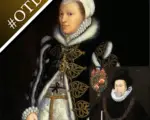
On this day in Tudor history, 26th April, Queen Anne Boleyn’s chaplain made a promise to the queen; Catherine Carey, daughter of Mary Boleyn, married Francis Knollys; and playwright William Shakespeare was baptised…
[Read More...]
On this day in Tudor history, 26th April, Queen Anne Boleyn’s chaplain made a promise to the queen; Catherine Carey, daughter of Mary Boleyn, married Francis Knollys; and playwright William Shakespeare was baptised…
[Read More...]
On this day in Tudor history, 23rd April, Sir Nicholas Carew was elected to the Order of the Garter, rather than George Boleyn, whose name had also been put forward; and the famous playwright William Shakespeare died on a day that may also have been his birthday…
[Read More...]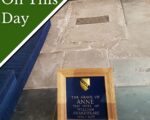
On this day in history, 6th August 1623, Anne Hathaway, wife of William Shakespeare, died.
Anne married Shakespeare in 1582 when she was pregnant with their first child. They had three children, Susanna, and twins, Judith and Hamnet. Hamnet died young.
Anne was buried next to Shakespeare at Holy Trinity Church.
[Read More...]
On this day in Tudor history, 13th March 1619, actor and star of Shakespeare’s Lord Chamberlain’s Men and the King’s Men, Richard Burbage, died aged fifty.
Burbage performed with William Shakespeare and is named in Shakespeare’s will of 1616 as a “fellow”, meaning a close friend or colleague.
Let me give you a few facts about this Elizabethan actor…
[Read More...]
On this day in Tudor history, 27th November 1582, in the reign of Queen Elizabeth I, the famous playwright William Shakespeare married Anne (also known as Agnes) Hathaway at Temple Grafton, near Stratford-upon-Avon, in Warwickshire.
Shakespeare was eighteen years old when he married his twenty-six-year-old bride, who was pregnant at the time of their marriage. Anne gave birth to a daughter, Susannah, the following May. The couple went on to have twins, Hamnet and Judith, in 1585.
Find out more about William Shakespeare and Anne Hathaway, and their marriage, and also what happened to them…
[Read More...]
On this day in Tudor history, 8th September 1601, in the reign of Queen Elizabeth I, John Shakespeare, father of playwright William Shakespeare, was buried at Holy Trinity Church in Stratford-upon-Avon.
John Shakespeare was a glover and whittawer from Stratford, and he was also an important man in the town. He’d served as high bailiff, chief alderman and deputy bailiff, and had been given the right to educate his children at the local grammar school for free.
He wasn’t just an upstanding member of the town, though, he also ran into trouble at times…
[Read More...]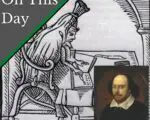
On this day in Tudor history, 3rd September 1592, in the reign of Queen Elizabeth I, Elizabethan writer and playwright Robert Greene died in London.
Robert Greene was a prolific writer, but he is best known for the pamphlet “Greene’s Groats-worth of Wit bought with a Million of Repentance”. It was said that he wrote the pamphlet on his deathbed.
[Read More...]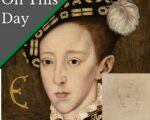
On this day in Tudor history, 6th August 1549, in the reign of King Edward VI, the Crown’s forces met the rebels of the Prayer Book Rebellion in another battle, the Battle of Clyst Heath.
I share an account of the battle of which Lord Grey said “he never, in all the wars that he had been, knew the like”. I also explain what happened next in the Prayer Book Rebellion of 1549.
[Read More...]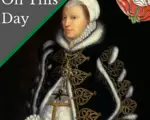
On this day in Tudor history, 26th April 1540, Catherine Carey, daughter of Mary Boleyn and a maid of honour to Queen Anne of Cleves, married Francis Knollys.
The marriage was happy and successful, and resulted in at least 14 children…
[Read More...]
Not only is today the anniversary of the traditional birthdate of William Shakespeare in 1564, but it is also the anniversary of his death in 1616!
In this video, I share some facts about the Bard, along with a few phrases from his works that have become part of common parlance.
[Read More...]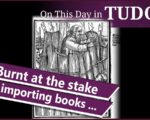
On this day in Tudor history, 27th November 1531, former Benedictine monk and reformist, Richard Bayfield, was burnt at the stake at Smithfield for heresy after Sir Thomas More had caught him importing heretical books into England.
It wasn’t Bayfield’s first brush with the authorities. He’d been in trouble for heresy previously so was now deemed a “relapsed heretic”. This time, penance wasn’t enough, he was condemned to death.
Find out more about Richard Bayfield, how he went from being a monk to a reformer, and how he ended up at the stake as a Protestant martyr in this video…
[Read More...]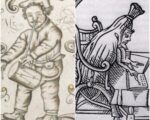
On this day in Tudor history, 3rd September 1588, or possibly the 5th September, actor and clown, Richard Tarlton, died in Shoreditch. He was buried in St Leonard’s Church, Shoreditch.
Tarlton was a member of the Queen’s Men acting company, but is famed for his post-play jigs as a clown. He was also known for being able to cheer up Queen Elizabeth I – how wonderful.
Find out more about Tudor clown Richard Tarlton, his life and career…
[Read More...]
On this day in history, 6th August 1623, Anne Hathaway, wife of William Shakespeare, the famous playwright, died.
Find out a bit more about Anne Hathaway, and hear the tomb inscription written about her by her son in law, in this edition of #TudorHistoryShorts…
[Read More...]
As Friday was the anniversary of the traditional birthdate of the Bard, William Shakespeare, on 23rd April 1564, I thought we’d celebrate by testing your knowledge of his plays.
How much do you know about Shakespeare’s plays?
Find out with this fun wordsearch!
Warning: the words can go in any direction!
[Read More...]
On this day in Tudor history, 26th April 1564, the Bard, William Shakespeare, was baptised at Holy Trinity Church, Stratford-upon-Avon, Warwickshire. This was just three months before the plague hit the town, wiping out a fifth of its population. Fortunately for him, and us, Shakespeare didn’t catch it – phew!
Find out more about the plague and its outbreak in Stratford-upon-Avon in today’s talk.
[Read More...]
On this day in Tudor history, 4th April 1572, William Strachey (and who knows if Claire pronounces his name right!), writer and historian of Virginia, was born in Saffron Walden in Essex, England.
Strachey’s account of the 1609 shipwreck of the Sea Venture in a hurricane was used as a source for William Shakespeare’s “The Tempest”.
Find out more about Strachey, how he was marooned for a year, and why he died in poverty, in today’s talk.
[Read More...]
On this day in history, 16th March 1619, actor Richard Burbage was buried at St Leonard’s Church, Shoreditch.
Burbage was a famous actor in the reigns of Queen Elizabeth I and King James I, peforming for royalty and even being in King James’ company of players. Burbage was also a good friend of William Shakespeare, and the two men were involved in the building of the famous Globe Theatre.
Find out more about Richard Burbage, his life and career, in today’s talk.
[Read More...]
As it was the anniversary of William Shakespeare’s marriage to Anne Hathaway this week, I thought we’d celebrate their union with a crossword puzzle on Shakespeare’s plays. How much do you know about the Bard’s works? Test yourself with this fun puzzle.
[Read More...]
On this day in Tudor history, 27th November 1582, eighteen year-old William Shakespeare, the famous playwright and a man known as the Bard, married twenty-six year-old Anne (also known as Agnes) Hathaway, at Temple Grafton, near Stratford-upon-Avon, in Warwickshire.
Anne Hathaway was pregnant at the time of their marriage and went on to give birth to a daughter, Susannah, the following May. The couple went on to have twins, Hamnet and Judith, in 1585.
Find out more about William Shakespeare and Anne Hathaway, and their marriage, and also what happened to them, in today’s talk:
[Read More...]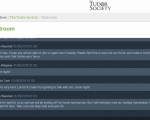
Thank you so much to Cassidy Cash for being our August expert speaker and for allowing us to grill her in the Tudor Society chatroom last week.
Here is a transcript of the live chat…
[Read More...]
On this day in Tudor history, 3rd September 1592, in the reign of Queen Elizabeth I, Elizabethan writer and playwright Robert Greene died in London.
Greene was a prolific writer, but he is best known for a pamphlet “Greene’s Groats-worth of Wit bought with a Million of Repentance” which it was claimed he wrote on his deathbed. It is an important work because it is the first known contemporary reference to William Shakespeare as a playwright, although the reference to Shakespeare is actually an attack on the actor/playwright, who Greene saw as an “upstart crow”.
Find out more about the pamphlet and why Greene, or whoever wrote it, launched an attack of the Bard, in today’s talk.
[Read More...]
A big Tudor Society welcome to Cassidy Cash of “That Shakespeare Girl” blog and “That Shakespeare Life” podcasts. Cassidy is sharing her knowledge of the Bard, William Shakespeare, with us in her talk “The Life of Shakespeare”.
[Read More...]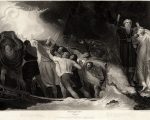
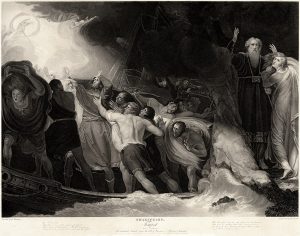 On this day in history, 4th April 1572, William Strachey, writer and historian of Virginia, was born. When I was researching for my book On This Day in Tudor History, I noticed that William Shakespeare was said to have used Strachey's account of the 1609 shipwreck of the Sea Venture as a source for his play “The Tempest”. This made me want to know more about Strachey and the shipwreck, plus his account of it.
On this day in history, 4th April 1572, William Strachey, writer and historian of Virginia, was born. When I was researching for my book On This Day in Tudor History, I noticed that William Shakespeare was said to have used Strachey's account of the 1609 shipwreck of the Sea Venture as a source for his play “The Tempest”. This made me want to know more about Strachey and the shipwreck, plus his account of it.
William Strachey was born in Saffron Walden, in Essex, on 4th April 1572, and was the son of William and Mary (née Cooke) Strachey. William was educated at Emmanuel College, Cambridge, before he joined Gray's Inn in London. Strachey's biographer, Betty Wood, writes of how his interest in literature, brought him into contact with men like William Shakespeare, Ben Jonson, and Thomas Campion. His sonnet "Upon Sejanus" was published in Ben Jonson's play "Sejanus His Fall" in 1605. Strachey was also a shareholder in the Children of the Revels, a troupe of boy-actors.
In 1602, he inherited his father's estate and lived off that until his money dwindled in 1605. In 1606, he obtained the position of secretary to Thomas Glover, the English ambassador to Constantinople, but he returned to England in 1607 after being dismissed. In 1609, he purchased two shares in the Virginia Company of London and in June 1609, he set sail for Virginia on the Sea Venture, which was captained by Christopher Newport. Unfortunately, a "terrible storme", i.e., a hurricane, caused the ship to run aground on an uninhabited island in the Bermudas, which Strachey described as "Devils illands" that were to be "feared and avoyded … above any other place in the world". Strachey and the ship's crew were stuck there for nearly a year. They were eventually able to construct two boats, Patience and Deliverance, which allowed them to continue their journey. Strachey wrote an account of the shipwreck and what Betty Wood describes as "the precarious state of the settlement at Jamestown" in a letter dated 15th July 1610, but it was suppressed by the Virginia Colony. It was eventually published in 1625 as "A true reportory of the wracke, and redemption of Sir Thomas Gates Knight; vpon, and from the Ilands of the Bermudas: his coming to Virginia, and the estate of that Colonie then, and after, vnder the gouernment of the Lord La Warre, Iuly 15. 1610" in Purchas his Pilgrimes, four-volume collection of travel narratives by Samuel Purchas.
Strachey served as secretary of the Virginia Company and was asked by the company to write an official account of the colony, which he did, on his return to London in 1611. However, his "The Historie of Travaile Into Virginia Britannia", was critical of the colony, like his earlier account, and so was not published in his lifetime.
Strachey also compiled a glossary of words used by the Powhatan people. You can read this at https://repository.si.edu/bitstream/handle/10088/22095/bae_bulletin_157_1955_46_189-202.pdf.
Strachey was married twice: to Frances Forster, and to a woman named Dorothy. He had two sons with Frances: William and Edmund.
Strachey died in June 1621 and was laid to rest in St Giles' Church, Camberwell in Surrey, UK.
Here are links to Strachey's accounts of Virginia so that you can read them for yourself:
Picture: The shipwreck in Act I, Scene 1, of The Tempest, in a 1797 engraving by Benjamin Smith after a painting by George Romney.

On this day in Tudor history, 19th March 1563, Arthur Brooke, the man who wrote the very first version of the story of Romeo and Juliet in English, died in a shipwreck off the coast of Sussex.
Find out more about Arthur Brooke and his version of Romeo and Juliet in today’s video.
[Read More...]
Today’s Claire Chats video was inspired by my recent visit to Stratford-upon-Avon with the Discover the Tudors tour. We visited Shakespeare’s birthplace, New Place, Hall’s Croft, Guild Hall and Shakespeare’s Schoolroom, and Holy Trinity Church, and although I grew up in the area and studied Shakespeare and his works at school and university I learned so much about the man from our guide and speakers. I wanted to share some of that with you today.
[Read More...]
As you probably already know, the 23rd April is the traditional date for celebrating the birth of William Shakespeare, playwright, poet and actor. We don’t know his actual birthdate, as it was not recorded, but we know that he was baptised on 26th April 1564 and baptisms usually took place within a few days of birth. St George’s Day seems a good day to celebrate the Bard’s birthday.
23rd April is also, sadly, the anniversary of Shakespeare’s death. He died on 23rd April 1616 and was laid to rest in the chancel of Holy Trinity Church, in his hometown of Stratford-upon-Avon
[Read More...]
As Philippa and I are visiting Holy Trinity Church, the resting place of William Shakespeare and members of his family, as part of the Discover the Tudors tour in September, I dug out the talk I did on it for the Tudor Society a couple of years ago. New members might not have had a chance to see it as the archives are huge, so here’s the version Tim has just edited up for the tour. I hope you enjoy it.
[Read More...]
Today is the anniversary of the death of Anne Hathaway, wife of William Shakespeare, the Bard, in 1623. She was laid to rest next to her husband in the Church of the Holy Trinity, Stratford-upon-Avon.
Anne married Shakespeare in November 1582 when she was twenty-six and he was eighteen. She was pregnant at the time and gave birth to their daughter, Susannah, in May 1583. The couple went on to have twins, Hamnet and Judith, in February 1585. Anne outlived her husband, who died on 23rd April 1616.
Here is a video about Anne Hathaway:
[Read More...]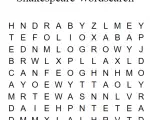
To commemorate William Shakespeare’s death on this day in 1616, and also possibly his birth in 1564, I’ve devised this wordsearch for you to puzzle over and enjoy. Be warned, the words can go any way – across, down, backwards, diagonally… Have fun!
[Read More...]
Sunday is the anniversary of the death of William Shakespeare in 1616 and possibly his birth in 1564, so is seems fitting for Claire to do a talk on him and to also share other resources on the Bard.
[Read More...]